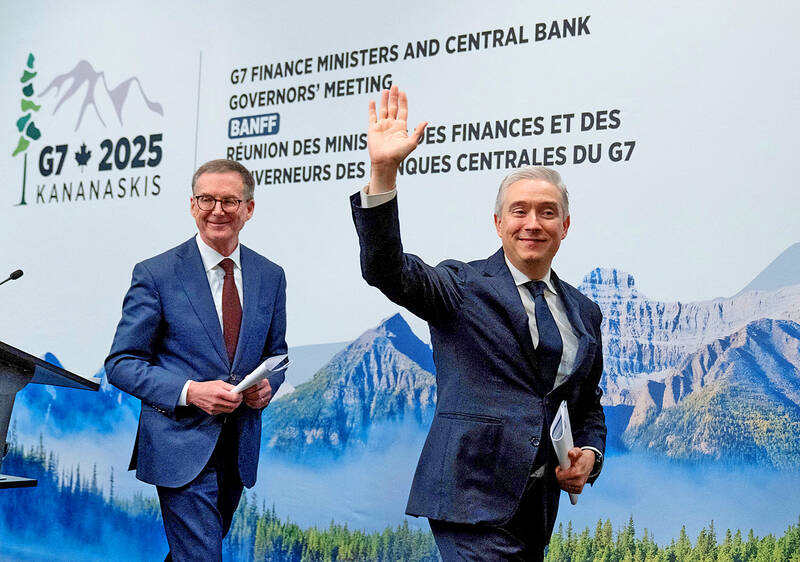Finance ministers and central bank governors from the G7 papered over their differences on Thursday, pledging to tackle “excessive imbalances” in the global economy and saying they could increase sanctions on Russia.
There had been doubt before the meeting whether it would issue a final communique, in light of divisions over US tariffs and Washington’s reluctance to refer to Russia’s war on Ukraine as illegal.
However, after three days of talks, participants signed on to a lengthy document devoid of previous language on fighting climate change, and which also softened references to the Ukraine war.

Photo: REUTERS
“We found common ground on the most pressing global issues that we face,” Canadian Minister of Finance Francois-Philippe Champagne told the closing news conference.
“I think it sends a very clear signal to the world ... that the G7 is united in purpose and in action,” he said.
The officials, who met in the Canadian Rocky Mountains, called for a common understanding of how “non-market policies and practices” undermine international economic security.
The document did not name China, but references by the US and other G7 economies to non-market policies and practices are often targeted at its state subsidies and export-driven economic model.
The G7 statement omitted mention of US President Donald Trump’s tariffs that are disrupting global trade and supply chains and swelling economic uncertainty.
The gathering sets the stage for a summit of G7 leaders from June 15 to 17 in the nearby mountain resort area of Kananaskis.
Trump would attend the summit, the White House confirmed on Thursday.
The communique called for an analysis of market concentration and international supply chain resilience.
“We agree on the importance of a level playing field and taking a broadly coordinated approach to address the harm caused by those who do not abide by the same rules and lack transparency,” the grouping said.
It also recognized an increase in low-value international “de minimis” package shipments that can overwhelm customs and tax collection systems, and be used for smuggling drugs and other illicit goods.
On the war in Ukraine, the communique also agreed that Russia could face further sanctions if it resisted a push toward a ceasefire.
“If such a ceasefire is not agreed, we will continue to explore all possible options, including options to maximize pressure such as further ramping up sanctions,” it said.

A Ministry of Foreign Affairs official yesterday said that a delegation that visited China for an APEC meeting did not receive any kind of treatment that downgraded Taiwan’s sovereignty. Department of International Organizations Director-General Jonathan Sun (孫儉元) said that he and a group of ministry officials visited Shenzhen, China, to attend the APEC Informal Senior Officials’ Meeting last month. The trip went “smoothly and safely” for all Taiwanese delegates, as the Chinese side arranged the trip in accordance with long-standing practices, Sun said at the ministry’s weekly briefing. The Taiwanese group did not encounter any political suppression, he said. Sun made the remarks when

The Taiwanese passport ranked 33rd in a global listing of passports by convenience this month, rising three places from last month’s ranking, but matching its position in January last year. The Henley Passport Index, an international ranking of passports by the number of designations its holder can travel to without a visa, showed that the Taiwan passport enables holders to travel to 139 countries and territories without a visa. Singapore’s passport was ranked the most powerful with visa-free access to 192 destinations out of 227, according to the index published on Tuesday by UK-based migration investment consultancy firm Henley and Partners. Japan’s and

BROAD AGREEMENT: The two are nearing a trade deal to reduce Taiwan’s tariff to 15% and a commitment for TSMC to build five more fabs, a ‘New York Times’ report said Taiwan and the US have reached a broad consensus on a trade deal, the Executive Yuan’s Office of Trade Negotiations said yesterday, after a report said that Washington is set to reduce Taiwan’s tariff rate to 15 percent. The New York Times on Monday reported that the two nations are nearing a trade deal to reduce Taiwan’s tariff rate to 15 percent and commit Taiwan Semiconductor Manufacturing Co (TSMC, 台積電) to building at least five more facilities in the US. “The agreement, which has been under negotiation for months, is being legally scrubbed and could be announced this month,” the paper said,

MIXED SOURCING: While Taiwan is expanding domestic production, it also sources munitions overseas, as some, like M855 rounds, are cheaper than locally made ones Taiwan and the US plan to jointly produce 155mm artillery shells, as the munition is in high demand due to the Ukraine-Russia war and should be useful in Taiwan’s self-defense, Armaments Bureau Director-General Lieutenant General Lin Wen-hsiang (林文祥) told lawmakers in Taipei yesterday. Lin was responding to questions about Taiwan’s partnership with allies in producing munitions at a meeting of the legislature’s Foreign Affairs and National Defense Committee. Given the intense demand for 155mm artillery shells in Ukraine’s defense against the Russian invasion, and in light of Taiwan’s own defensive needs, Taipei and Washington plan to jointly produce 155mm shells, said Lin,